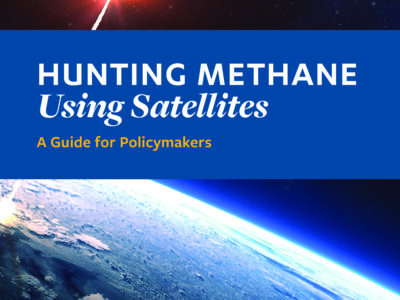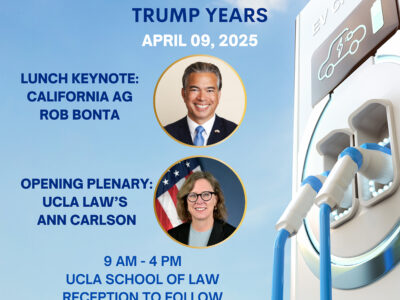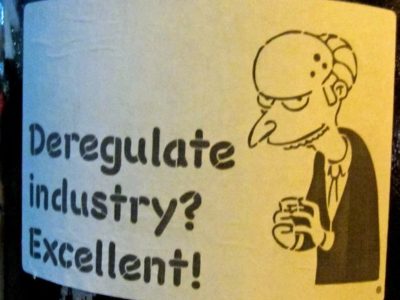Air Quality
Does Deregulation Hypercharge the Economy?
If the economics effects are that huge, you’d expect the unemployment rate reflect major regulatory or deregulatory moves. It doesn’t.
EPA’s head sats that “EPA will be reconsidering many suffocating rules that restrict nearly every sector of our economy and cost Americans trillions of dollars.” If regulation and deregulation are that big a deal economically, we should clearly see their imprint on unemployment. It turns out that even the biggest regulatory and most dramatic deregulatory actions have no discernible effect on the job market.
CONTINUE READING100 Days of Fear & Loathing in Climate World
The Drain is a weekly roundup of climate and environmental news from Legal Planet.
Are you tired of the words “100 days”? “In his first 100 days the Trump administration has slashed federal agencies, canceled national reports, and yanked funding from universities,” Grist puts it. “One hundred days of anti-environmental mayhem,” says Dan Farber at Legal Planet. My UCLA colleague Ann Carlson is quoted by the New York Times …
Continue reading “100 Days of Fear & Loathing in Climate World”
CONTINUE READINGUnsheathing a Weapon for Clean Air: ISRs
New UCLA Law report focuses on how to use Indirect Source Rules to fight pollution from mega facilities.
We don’t have to tell you that air pollution remains a serious threat to communities across California, from Oakland to the Inland Empire. But what if we told you that most air regulators are fighting air pollution with one hand tied behind their back, unnecessarily? It turns out there is a powerful weapon that can …
Continue reading “Unsheathing a Weapon for Clean Air: ISRs”
CONTINUE READING“What We Do Matters:” UCLA’s Charging Ahead Symposium
States and cities have a lot of tools to cut vehicle pollution. It’s time to break them out.
Trump is a bump. A nasty one, but a bump nonetheless, because the world is on the road to zero-emission fuels and vehicles no matter what. That was one takeaway from “Charging Ahead,” the UCLA Emmett Institute’s annual symposium held on April 9 — devoted this year to cutting vehicle pollution during the next four …
Continue reading ““What We Do Matters:” UCLA’s Charging Ahead Symposium”
CONTINUE READINGHunting Methane Using Satellites
Joint UC Berkeley – UCLA Law report aims to help policymakers harness the methane data revolution.
A stream of data about methane—a potent greenhouse gas—is now constantly being beamed down from space. New methane satellites provide a powerful data capability for governments who want to demonstrate leadership in climate policy. To equip policymakers with necessary information on satellite methane data, UC Berkeley Law’s Center for Law, Energy and the Environment (CLEE), …
Continue reading “Hunting Methane Using Satellites”
CONTINUE READINGSenate Parliamentarian Confirms that California Waivers Are Not Subject to the Congressional Review Act
Will Republicans honor her determination?
As I have previously written, the Trump Administration is attempting an end run around the administrative process it is supposed to follow if it intends to revoke the waiver California received for three important programs to cut air pollutants from cars and trucks. You can find the details about this end run around — using …
CONTINUE READINGGetting Creative on Vehicle Emissions
UCLA Law set to host a symposium on April 9 on ways to charge ahead on cutting emissions.
These are tough times for lovers of zero emission vehicles–and clean air. I probably don’t need to recite the threats to both, but here’s a sampling: the Trump Administration has pledged to roll back federal air quality standards and mobile source emissions standards; is gutting funding for EV charging networks (and is even, maddeningly, shutting …
Continue reading “Getting Creative on Vehicle Emissions”
CONTINUE READINGRegulatory Rollbacks: What to Expect
A replay of 2017? Or maybe something more radical? You can probably guess the answer.
Repealing and replacing existing environmental regulations will have a lower priority in this iteration of the Trump presidency – it will often be easier to just ignore the existing regulations or eliminate the regulators rather than the regulations. When it does rollback regulations, the administration will probably take more extreme legal positions and will be more likely to make constitutional arguments against environmental regulation.
CONTINUE READINGThe CRA and the filibuster
Expanding the scope of the CRA might also result in weakening the filibuster
This is the third in a series of blog posts examining the possible application of the Congressional Review Act (CRA) to California’s waivers under the Clean Air Act allowing the state to issue its own emissions standards for motor vehicles. The first post is here. The second post is here. Another possible implication of applying …
Continue reading “The CRA and the filibuster”
CONTINUE READINGThe CRA and permits
Applying the CRA to the California waivers might open the door to Congressional review of permits more broadly
This is the second in a series of blog posts examining the possible application of the Congressional Review Act (CRA) to California’s waivers under the Clean Air Act allowing the state to issue its own emissions standards for motor vehicles. The first post is here. The basic legal question at the heart of the dispute …
Continue reading “The CRA and permits”
CONTINUE READING











